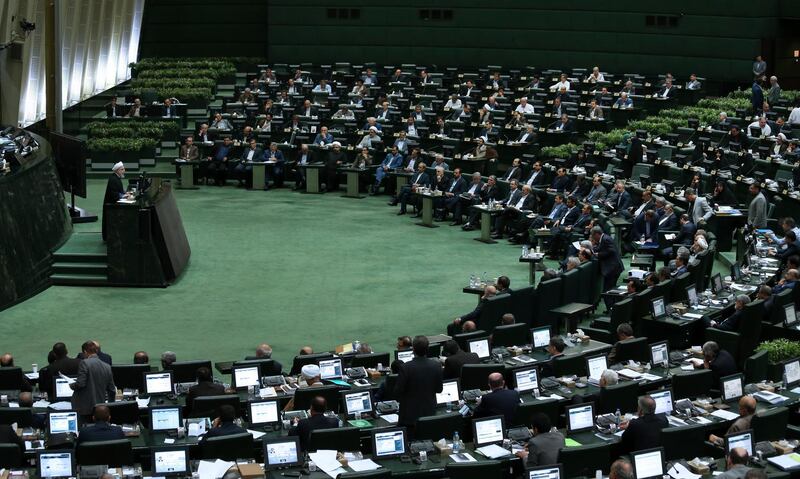It is tempting to feel a pang of sympathy for Iranian president Hassan Rouhani after this week’s bruising encounter with the country’s parliamentarians. The Iranian leader suffered the singular embarrassment of being summoned before Iran’s Majlis to explain the woeful state of the economy, which has been rocked by the intensification of economic sanctions since US President Donald Trump’s decision to withdraw from the nuclear deal in May.
With the proceedings broadcast live on Iranian television, parliamentarians grilled Mr Rouhani on his administration’s handling of the economy, with his inquisitors specifically focusing on five major areas of concern: unemployment, slow economic growth, the collapse of the rial, cross-border smuggling and the inability of Iran’s financial institutions to access global finance.
It was only on the banking issue, where the recent sanctions imposed by the Trump administration have severely limited Iranian access to global financial markets, that they were prepared to accept Mr Rouhani’s defence of his government’s record.
As for the rest, Mr Rouhani’s claims that the country’s perilous economic predicament was all the result of Washington’s aggressive stance towards Tehran drew short shrift. And justifiably so.
For, while Mr Rouhani will have found his interrogation session by the Majlis deeply disconcerting, the Iranian president personally shares much of the blame for the country’s economic woes, which is why feelings of sympathy towards him were in exceedingly short supply during his Majlis appearance.
Iran is currently in the midst of arguably its worst economic crisis since the 1979 Islamic revolution. The country’s official unemployment rate currently stands at 12 per cent, with youth unemployment as high as 28 per cent in a country where over 60 per cent of the 80 million population is under the age of 30. At the same time the rial has lost two-thirds of its value in a year.
Mr Rouhani’s somewhat predictable defence was to blame the crisis on the Trump administration, rather than accepting any blame on the part of his ministers. “I want to assure the Iranian nation that we will not allow the US plot against the Islamic Republic to succeed,” Mr Rouhani told the parliament. “We will not let this bunch of anti-Iranians in the White House be able to plot against us.”
The Iranian leader even had the temerity to blame the economic situation of the tens of thousands of Iranian protesters that have taken to the streets in cities across the country this year to voice their anger at government policies, claiming the demonstrations had encouraged Washington to impose more sanctions in the hope of causing further political discord. “The protests tempted Trump to withdraw from the nuclear deal,” he claimed.
The parliamentarians, though, are not buying Mr Rouhani’s excuses. For they, like the protesters who have been challenging government policy since the start of the year, know that the country’s economic difficulties go far deeper than the challenges caused by American sanctions.
The real drivers of Iran’s economic malaise lie in the endemic corruption that affects almost every aspect of Iranian commerce. Protesters are also angry at the concentration of large sections of the country’s wealth in the hands of big firms controlled by the Iranian Revolutionary Guard Corps, which uses them to fund their overseas military adventures in countries such as Yemen, Iraq and Syria.
As the leader of Iran’s so-called pragmatists, Mr Rouhani could defend himself by pointing out that many of the activities of the Revolutionary Guard are beyond his sphere of influence, as they answer directly to Iran’s supreme leader, 79-year-old Ayatollah Ali Khamenei.
This is certainly the position adopted by many Western policymakers, especially in Europe, who remain committed to the belief that, by maintaining a dialogue with Tehran and keeping the nuclear deal in place, they will encourage Iran to pursue a more constructive dialogue with the outside world.
This is the reason why many European powers, including Britain, continue to criticise the Trump administration’s decision to withdraw from the nuclear deal, and are looking for ways to maintain their ties with Tehran, even if such action is frowned upon in Washington.
Yet Iran’s track record since the deal was signed in 2015 speaks for itself. Far from seeking better relations with the world, Tehran has continued to maintain its aggressive posture towards the West and its allies in the region, a policy for which Mr Rouhani himself must share some of the blame.
For example, the new defence cooperation pact that Tehran has signed with Syria’s Bashar Al Assad this week has been undertaken on Mr Rouhani’s watch. If the Iranian president is really serious about forging better relations with the world, then why is he allowing his government to openly collaborate with the brutal Mr Al Assad?
The same question arises in regard to Iran’s shameful treatment of Nazanin Zaghari-Ratcliffe, the Iranian-British woman who has been jailed in Tehran on spurious spying charges. Mrs Zaghari-Ratcliffe was briefly released from prison last weekend, after spending the last two years in jail, to see her four-year-old daughter Gabriella. But hopes that her release would be extended were dashed when she was forced to return to jail. She has since been hospitalised having suffered panic attacks.
If Mr Rouhani had an ounce of humanity in his veins, he would intervene to end her suffering and release Mrs Zaghari Ratcliffe on humanitarian grounds at the very least. Instead he prefers to turn a blind eye, thereby ensuring her suffering continues.
In such circumstances, Mr Rouhani is not deserving of any sympathy for his political difficulties. On the contrary, he is as responsible as anyone in Tehran for Iran’s current plight, and must therefore be held accountable for his actions, both at home and abroad.
Con Coughlin is the Daily Telegraph’s defence and foreign affairs editor





